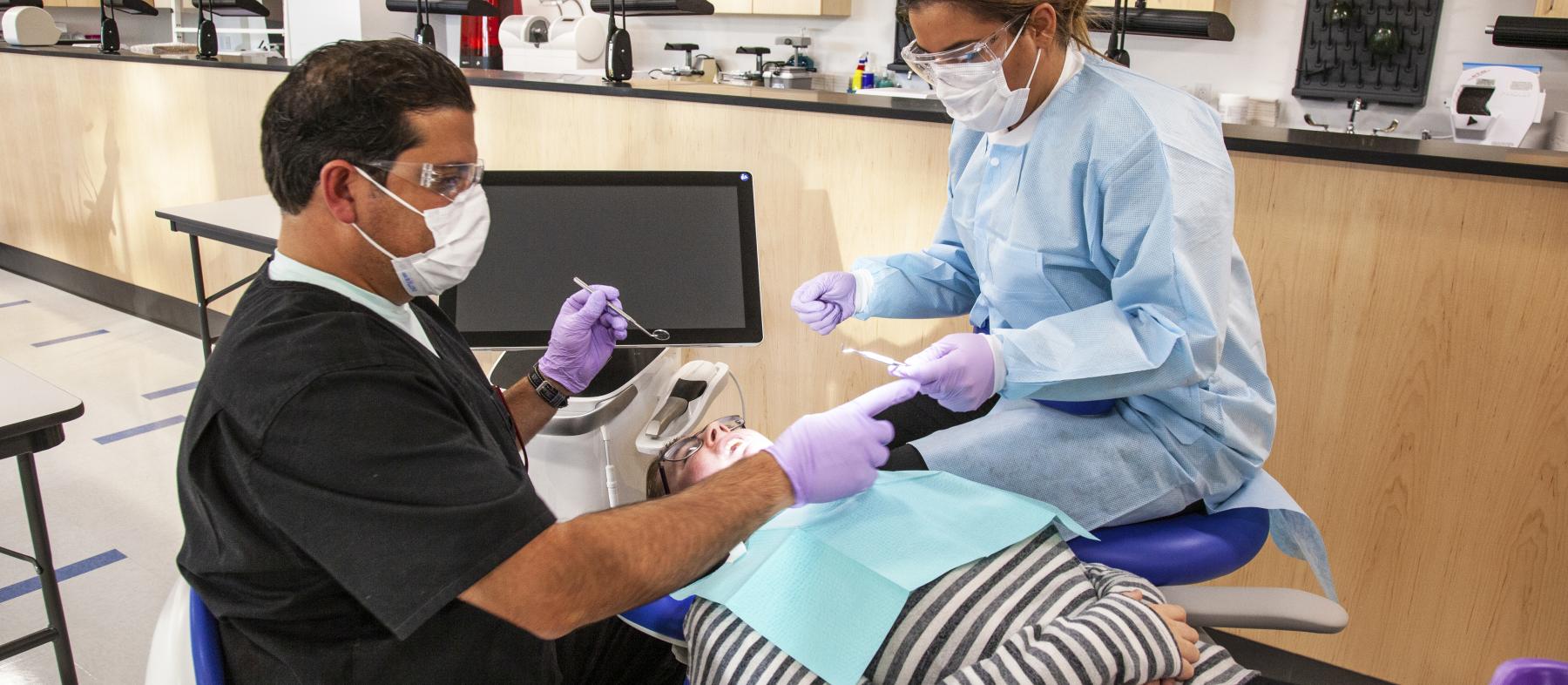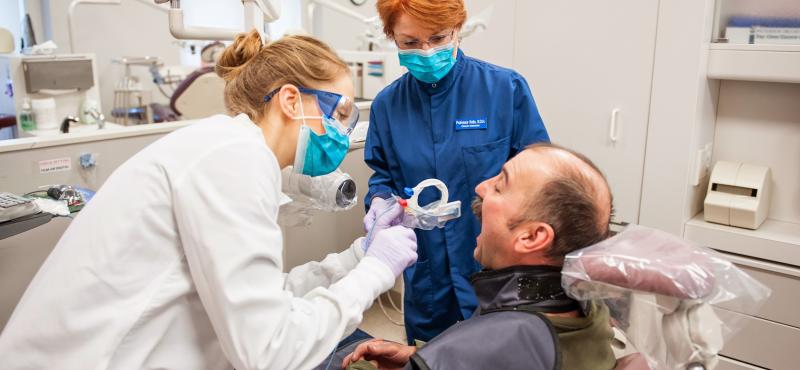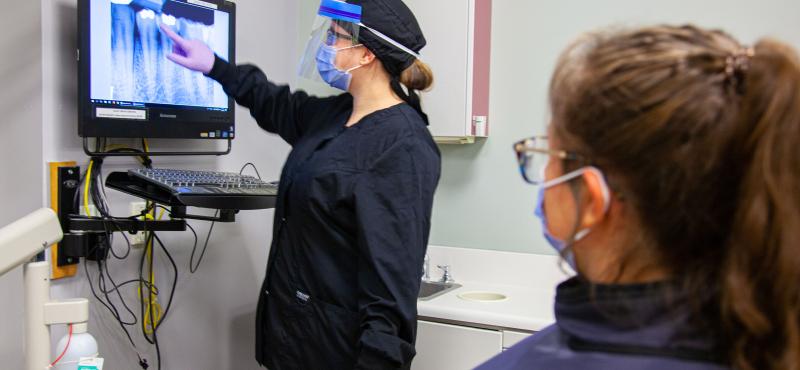Program Goals:
The QCC Dental Assisting Certificate - Weekend Option program includes the following Program Goals:
- To provide a Dental Assisting curriculum that is high quality, student centered, accessible and affordable to obtain entry-level employment as an integral member of the dental health team within six months of graduation, or enroll in an advanced education program.
- To competently and ethically perform chairside dental assisting and related office and laboratory procedures under the direction and supervision of the dentist within the guidelines of the Massachusetts Dental Practice Act and the Dental Profession.
- To demonstrate the appropriate level of knowledge needed to perform dental assisting functions by successfully challenging the Dental Assisting National Board Certified Dental Assistant examination.
- To conduct ongoing review of program goals and curriculum to ensure that the program continues to meet the needs of external organizations, the dental community, and students.
- To provide students with skills to communicate professionally with patients, and to be competent to communicate professionally, along with the skills to collaborate effectively with employers and other health care professionals.
- To engage in intellectual and professional growth, and appreciate the need for life-long learning activities to meet the changing needs and demands of the profession and the community by maintaining a Massachusetts Dental Assisting License, CDA status, and actively participating in the local and/or national level of the American Dental Assisting Association.
Student Learning Outcomes:
Upon completion of the program, graduates will be able to:
- Apply CDC, HIPAA, OSHA guidelines to their everyday use in a dental setting (community or private).
- Uphold professionalism, ethics, and integrity while providing daily tasks as a dental assistant.
- Explain any dental procedure or material in layman’s terms to a patient, or professional nomenclature to the healthcare community.
- Attend local or national meetings of ADAA.
- Apply knowledge of the Massachusetts State Delegable duties for a Dental Assistant.
- Demonstrate all modalities of dental assisting.
- Be competent in the use of technology as a learning resource and for information management.
Admissions Process:
Admissions inquiries should be directed to admissions@qcc.mass.edu. Prospective students may apply to the program of their choice by following the enrollment steps at www.QCC.edu/enrollment-steps.
Program Admissions Requirements:
Students should note that some first semester courses carry minimum prerequisites. Refer to the program grid.
- High School Diploma or GED/HiSET.
- Attendance at a Health Information Session or complete FYE 102 with a grade of “C” or higher.
- Must show evidence of being compliant with the immunization requirements specified by the Massachusetts Department of Public Health. Additional immunization requirements will be required for clinical experiences.
- English: Placement into college level English.
Program Retention / Progression Requirements:
To be eligible to continue in the program, students must:
- Achieve a grade of “C” or higher in all program courses designated by DAS.
- Achieve a grade of “C” or higher in BIO 100, DHY 125, DHY 131, DHY 241, and ENG 101.
- Maintain documentation of current Healthcare Provider Level BLS/CPR Certification.
- Maintain documentation of immunization currency and satisfactory health status.
- Maintain documentation of annual TB testing.
- Maintain documentation of health insurance.
- Be aware that they may be exposed to bloodborne pathogens. Bloodborne Pathogens means pathogenic microorganisms that are present in human blood and can cause disease in humans. These pathogens include, but are not limited to, hepatitis B virus (HBV) and human immunodeficiency virus (HIV). United States Department of Labor, OSHA, September 5, 2019 (www.osha.gov/laws-regs/regulations/standardnumber/1910/1910.1030).
Program Readmission Requirements:
There is a one-time readmission policy for the program.
- Readmission is not guaranteed and is always based upon space availability.
- Students who did not earn a grade of “C” or higher in BIO 100, DHY 125, DHY 131, DHY 241, ENG 101, or any program courses designated by DAS need to re-apply to the program through the Admissions Office. Students need to meet the current admission requirements. Students should contact the Program Coordinator as soon as they receive the notification of being placed on the waitlist (by April 15) to discuss readmission.
- Students who did not earn a grade of “C” or higher in any other DAS course should contact the Program Coordinator by April 15 to discuss readmission.
- Students who have been dismissed or administratively withdrawn from a program within the School of Healthcare at Quinsigamond Community College for reasons of “clinically unsafe practice/behavior” or who violate the College’s Student Code of Conduct or Policy on Affirmative Action are not eligible for admission/readmission to any Healthcare program.
Program Graduation Requirements:
Students must satisfy all course and program requirements, including regulations related to attendance and conduct, in order to be eligible for graduation.
CORI, SORI, Finger Printing & Drug Testing:
Criminal Offender Record Information (CORI), Sex Offender Registry Information (SORI), and National Background checks are required in the program, either annually or every semester. Fingerprinting and drug testing may be required. Fingerprinting and drug testing results must meet clinical requirements. An issue with CORI/SORI, National Background, fingerprinting and/or drug testing could prevent a student from participating in a clinical/field rotation, which could result in dismissal from the program.
Additional Cost:
See the Program Fees page.
- Students should anticipate additional expenses for uniforms/clinical wear, textbooks, licensing examinations, and required skills remediation.
Technical Performance Standards:
See the Technical Performance Standards page. (Note: Not all programs have technical performance standards).
- The QCC Dental Assisting program is deeply committed to diversity and fostering an inclusive environment that represents the diverse population of healthcare professionals. We value the uniqueness and potential of every learner and strive to create a culture of respect and equality, welcoming all students, including individuals with disabilities. We encourage students with disabilities to disclose their needs and seek accommodations to fully engage in our program. All disability-related conversations and requests are handled through a confidential process to protect the privacy of our students. After reviewing the Technical Performance Standards, students who have questions about accommodations should contact QCC Student Accessibility Services as soon as possible. Given the complexities of clinical-based programs, additional time may be needed to effectively implement accommodations.
- For more information, contact QCC Student Accessibility Services:
Credit for Prior Learning:
Credit for Prior Learning (CPL) allows students to use skills they already have towards a college degree or certificate. Work, life, volunteer and military experience may be translated into credit, allowing students to take fewer classes and earn their degree faster. CPL eliminates redundancies for students who have already earned credentials or mastered skills required for their program of study. Email experience@qcc.mass.edu for more information and eligibility.
Career Outlook:
Please consult the Massachusetts Career Information System at https://masscis.intocareers.org/ or the Occupational Outlook Handbook at www.bls.gov/ooh/ for specific occupational information. The CIP code for this program is 51.0601.
Transfer Articulations & Opportunities:
Prospective students may learn more about transfer articulation agreements at www.QCC.edu/agreements. More information regarding transfer opportunities is available at www.QCC.edu/transfer.
Additional Information:
- It is suggested that students take BIO 100 and ENG 101 prior to entering the program.
- Students will need to provide their own transportation to dental offices within Worcester County.
Dental Assisting “Bridge” to Dental Hygiene:
Graduates of the QCC Dental Assisting Certificate programs (Program Code: DA, DAWO) may transfer into the QCC Dental Hygiene - Associate in Science program (Program Code: DH) if they meet the current program admissions requirements for the Dental Hygiene program.
- Subject to space availability, up to two seats in the Dental Hygiene freshman class will be reserved for currently-enrolled QCC dental assistants scheduled to graduate in May who have met all the admission criteria for the Dental Hygiene program. Students must bridge directly from the Dental Assisting program to the Dental Hygiene program. “Bridge” selection applications may be obtained from the Dental Assisting Program Coordinator. Decisions will be made by April 15 each year and pending final grades at the end of the semester.
- Dental Assisting graduates may be eligible to by-pass the Dental Hygiene waitlist if the following criteria are met:
- Minimum Grade Point Average (GPA) of 3.30 overall at the end of Spring semester.
- Minimum grade of “B” in all QCC DHY courses and obtain a minimum grade of “73” on the final exams/exit exams for DHY bridge courses (DHY 125, DHY 131, DHY 241), in order to qualify for the “bridge” from the Dental Assisting to Dental Hygiene program.
- Minimum grade of “A-” in the DAS 151, DAS 153, and DAS 155 courses.
- Two recommendations from QCC DHY core course faculty, of which one is from a full-time faculty member.
- BIO 111, CHM 101, and ENG 101 must be completed before submitting the application. BIO 112 and ENG 102 must be taken in Summer I. BIO 232 and DHY 125 must be taken in Summer II.
- Attendance at a Health Information Session or complete FYE 102 with a grade of “C” or higher.
- Students must have passed DANB CDA exam, with proof of the official certificate from DANB.
- Students will need to audit DHY 241. This will entail attending all DHY 241 lab sessions. Attending lectures is optional.
- All bridge students who have taken DHY 131, and passed with a “B” or higher within one year of entering the Dental Hygiene program, will be required to demonstrate competency the Summer before entering or re-entering the program. This will be scheduled for three hours in July/August. If students fail the competency exam, they will be required to enroll in or audit DHY 131L.
- Students who have taken DHY 131 prior to one year will be required to retake the course.
- In addition, students will also be required to demonstrate competency the following December/January before treating patients. There is no fee for this competency evaluation. If students do not demonstrate competency, they will be required to participate in remediation prior to exposing radiographs on patients. The competency will consist of:
- Review of QCC Dental Hygiene program radiograph exposure protocols, forms, and documentation.
- Review of exposing film-based intra-oral radiographs and darkroom procedures.
- Review and exposure of various radiographic techniques and modalities on manikins.
Notice of Opportunity to File Complaints:
The Commission on Dental Accreditation will review complaints that relate to a program’s compliance with the accreditation standards. The Commission is interested in the sustained quality and continued improvement of dental and dental-related education programs; however, the Commission does not intervene on behalf of individuals or act as a court of appeal for treatment received by patients or individuals in matters of admission, appointment, promotion or dismissal of faculty, staff or students. A copy of the appropriate accreditation standards and/or the Commission’s policy and procedure for submission of complaints may be obtained by contacting the Commission at: Commission on Dental Accreditation | 211 East Chicago Avenue, Chicago, IL 60611 | 800.621.8099, ext. 4653.






